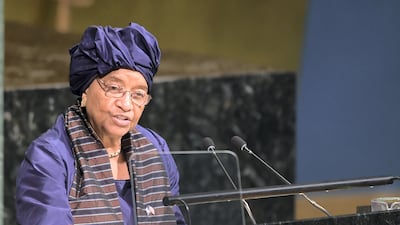If the size of a president's trophy cabinet is any measure of success, then Ellen Johnson Sirleaf will be a hard act to follow. The outgoing Liberian leader has received all manner of awards and laurels during her 12 years in office, including the Nobel Peace Prize, the US Presidential Medal of Freedom – America’s highest civilian honour – and no less than eight honorary degrees, among them awards from both Yale and Harvard.
As Africa's first elected woman president, Ms Sirleaf managed to be all things to all men and all women: feminists lauded her work on women's rights, celebrity aid activists such as Bono championed her war on poverty, and institutions such as the International Monetary Fund praised her handling of Liberia’s war-ravaged finances.
All of which means that her departure will inevitably leave a gap - not just for Liberia's five million people, but for West Africa as a whole. The Sirleaf "halo" shone well beyond her own borders - putting the spotlight on a long-neglected and underdeveloped region, and setting precedents that have made it a beacon for democracy on the continent.
In January, for example, it was Ms Sirleaf, along with fellow West African presidents, who persuaded Gambian dictator Yahya Jammeh to step down when he lost elections. Thus was the kind of crisis that used to keep the region in constant civil war averted.
The tiny grandmother also had powerful female cheerleaders such as Hillary Clinton, as was proved when she asked for military help during the Ebola crisis. At a time when America was still wary of any "humanitarian" mission to Africa - its efforts in Somalia 20 years ago ended in the "Black Hawk down" debacle - the arrival of 3,000 troops within weeks told its own story.
"She had a network that was useful during the likes of the Ebola crisis," said Jonathan Gant, a senior campaigner with watchdog group Global Witness. "As the president's tenure ends, those useful ties, which have helped bring stability and aid to the region, can only loosen."
Although ranked among the best leaders in the world by Time and Newsweek, Ms Sirleaf has not achieved the universal praise accorded to Nelson Mandela. Many feminists say she did not advance their cause much as she could have done - failing to back calls, for example, on minimum quotas for women MPs. The credibility of her drive against corruption and nepotism also took a hit when she appointed three of her children to senior government jobs.
But even her staunchest critics concede that in simply stabilising Liberia after a quarter of a century of coups and civil war, she achieved a near-impossible task.
______________________
Read more:
Liberians vote for president in high-stakes contest
Emma Thompson's harrowing tale from Liberia
___________________________________________
Created in 1847 as a new home for freed American slaves, Liberia aspired to be a model to the rest of Africa from the outset, but quickly made many of the same mistakes. Early settlers lorded it over local tribes in much as the same way as white colonialists had done, creating tensions that erupted with a bloody coup in 1980 against William R Tolbert Junior, the Americo-Liberian president. His successor, Samuel Doe, was in turn killed a decade later during the anti-government uprising led by warlord Charles Taylor, who plunged the country into a 14-year civil war that killed at least half a million people.
As such, the government that "Ma Ellen" inherited in 2005 was bankrupt, traumatised, and held together largely by UN peacekeepers and aid agencies. The former World Bank economist proved adept at wooing the latter, while also pursuing sufficiently sound economic policies to get generous debt relief from western creditors.
"Her record in some areas, like gender and equality, might not be as good as some had hoped, but many of these are long-term structural issues which she couldn't solve alone anyway," said Nic Cheeseman, professor of democracy and development at Britain's University of Birmingham. "She has, though, been a stable leader of Liberia and you can't underestimate that. She took over a country that did not have the preconditions for democracy, with a history of war, a lot of ex-fighters, and a government with very little money. You have to give her some credit, if not perhaps ten out of ten."
A final measure of that success has been to organise a set of peaceful elections to choose her successor. But while whoever takes over will inherit a country that is no longer at the risk of collapse, they will still face formidable challenges. The health service is still in post-Ebola recovery mode, and so too is the economy, with youth unemployment at around 85 per cent. Future challenges may also be trickier to meet, such as diversifying the economy beyond rubber and timber exports, and weaning the government off aid dependency.
With Liberia now off the critical list, even the most competent successor to Africa's "Iron Lady" is unlikely to enjoy the same acclaim. Rather than being feted on the international stage, they may have to settle for being just another leader of just another small African democracy. In the view of Liberia’s long-suffering citizens, though, that should be achievement enough.

